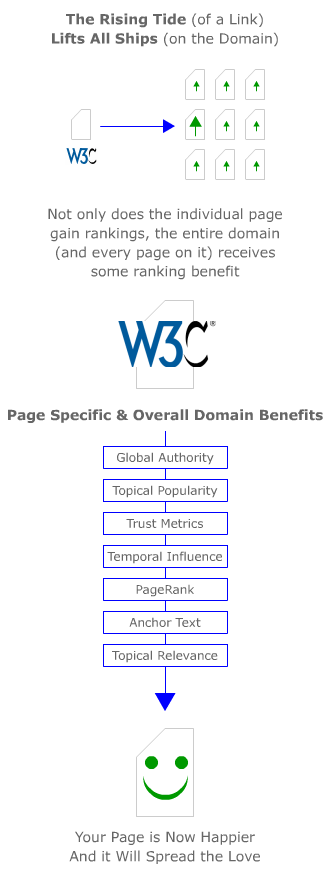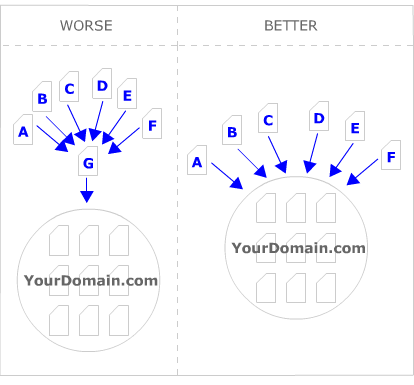
The Rising Tide Lifts All Ships
The author's views are entirely their own (excluding the unlikely event of hypnosis) and may not always reflect the views of Moz.
I hate to revisit this topic again so soon, but it appears to require clarification for many folks. I've tried to lay out the process of how this theory works as clearly as possible, and provide a few examples.

In our example above, the W3C page (a highly valuable resource on web standards) linking to your page can have an impact on the rankings of all the pages on your site. This isn't just a replication of the classic PageRank flow model (PageRank in its original form is nearly dead, IMO), it's an indication of all the tasty factors that the W3C can pass to your site making the search engines take your domain's content a bit more seriously.
The general premise seems simple to me - search engines provide recognition to a domain based on the trust and editorial weight it has received from current and past links. Content on a well-linked to domain often outranks far more relevant or individually well-linked-to content on other, less linked-to domains. Although I get a lot of nodding heads when I explain this, the theory seems to break down in practice. People I've talked to hear this theory and still wonder if they should link build in to multiple domains and then link all those domains to their main site. They ask if they should host their blog on a separate domain or how to build content for a domain they just registered and I'm always left thinking - "hey, didn't we just go over this?"
If the above illustration wasn't enough to convince you, let me give another quick visual on a related note. In this diagram, it's important to think of the linking pages A-G as equal to one another (and on different domains than one another).

When I say "worse," I mean a lot worse. There's no scientific way for me to quantify how much less the example on the left is worth, but my spidey senses tell me it's about 1/9th of the value. That's not good - you should want 9/9ths of the value for your link building campaigns, particularly since attracting links is one of the hardest things search marketers (and website owners) have to do.
Here's a few practical applications of the "Rising Tide" rule:
- Don't launch your blog on a separate domain
- Don't create a series of junk domains that will link in to your primary site (spending that $7 each year on Ho-Hos is a better investment)
- Don't write great articles or content that goes on other sites just for the value of the single link back (there are other marketing and branding reasons to do this, but it doesn't make sense from a pure link-focused persepective)
- If you have completely separate businesses or passions that you want to dive into, see if there's a way you could relate them enough to justify building a single general or broad subject website, rather than creating many.
- If you're a big brand launching websites to go along with offline media campaigns, 301 that site back to a subfolder on your main domain.
- Unless you're in the business of building and selling domains, it almost certainly pays more to concentrate on one single domain and make that site the most authoritative it can be.
And now a few examples of this effect in action:
- In a search for my name, Wikipedia's page about me (which was just recently created) is ranking ahead of thousands of more valuable, targeted and well-linked-to pages, but since the Wikipedia domain is so strong, even new content with barely any links gets tremendous respect from Google.
- In a search for 24 season two, Amazon.com's page, with less than half the external links and lower direct relevance than Fox's 24 page is ranking #1. In fact, there's almost a dozen big-name domains with few external inbounds ranking ahead of the official page.
- A search for oatmeal reveals that SEOmoz is a significantly more powerful domain than many popular breakfast brands (and that Matt, our developer, has a wonderfully twisted sense of humor).
- Michael Martinez likes to point out that Matt Cutts' blog has pages in supplemental as a juxtaposition to my arguments above, yet when we look at the pages on Matt's site that are in supplemental, they rank first, even for topics and terms that Matt is rarely associated with, like this search for languages, this one for howto files and this one for firefox vs ie stats. Note that this is also a good example of why you shouldn't worry about having lots of pages in supplemental (neccessarily), as long as your rankings are kicking tail :)
I hope this blog post helps lay the issue to rest a bit. If you've got more examples to share, I'd be grateful - it's late and I'm tired after the drive back from Portland. More on the SEMPDX show tomorrow, BTW :)




Comments
Please keep your comments TAGFEE by following the community etiquette
Comments are closed. Got a burning question? Head to our Q&A section to start a new conversation.